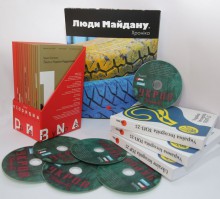On February 20 each Den’s subscriber has got a free music supplement to the Friday number of the newspaper: a new patriotic album UKROP by Haidamaky. This joint initiative of the Charitable Foundation in Support of the Newspaper Den’s Initiatives and the Ukrainian performers aims to promote the interpretation of the last year’s experiences on a new level.
Besides, during Haidamaky’s March concert tour in Germany and Poland, the Charitable Foundation in Support of the Newspaper Den’s Initiatives will present Den’s Library to the European public.
In the run-up to the tour we offer our readers an interview with the band’s frontman Oleksandr YARMOLA.
“We had already such experience in Poland, when we were working on a new album and released a single together with Gazeta Wyborcza, one of the country’s best-known periodicals. We want to attract people with the drive in our songs, and with smart lyrics. Today Ukrainians are prepared to invest in quality. We need to breed our willpower, and consolidate.”
Recently Haidamaky went on a mini-tour for the wounded troops undergoing treatment in hospitals of Kharkiv and Dnipropetrovsk. Why is it important for Ukrainian performers to support our men?
“We started our tours to the front line as far back as in June. We wanted to make our own contribution in the fight. If you do not take up arms, if you are far from the front line, do your best. If you are an artist, then you must make music that best fits this day. If you are a painter, then paint pictures. If you are a scientist, make discoveries. If you are a politician, implement reforms. The main thing is not to waste time.
“We did our best to bring our songs to the very front. We performed in Pisky, before hell broke out. Now music is probably the last thing the guys want there. Such tours are also good for artists. We made many friends there, and I asked the boys if they really needed these concerts. They say they are very important for them. They were torn away from peaceful life, they crossed the division line between war and peace, they are living in a rough men’s world, but they remember this peaceful world and expect support from there.”
By the way, you have a song which you wrote together with Oleksandr Tkachuk, a soldier. How did you find him?
“It was he who found us, such a young, energetic guy. I liked his determination: he conceived his idea and offered it then and there. We liked both his concept and his lyrics, and the music was ready in no time. This is how the song UKROP appeared.”
And what is the general message of your new album UKROP?
“The idea resembles what Tkachuk proposed: to show the war not through revenge and hatred, which takes on. People directly involved in warfare are affected by it, whether they want it or not. The entire society can be sucked into this whirlpool of hate, and there will be no end to it. But there must be an end. War has always meant evil and grief. What we wanted to show is the positive side of patriotism and Ukrainians’ resistance.”
How hard was it to work on the song “Wooden Shields” dedicated to the Heavenly Hundred?
“We were on Maidan in those days. It left such powerful impressions… The fallen were indeed perceived as angels.”
Is it possible to attract people’s attention to Ukrainian history through Ukrainian music?
“And not only through music: fine arts, poetry, books. Our new album traditionally includes arrangements of folk songs. Never before did we sing ‘The Cossack Was Leaving for War,’ but the time has come. We always draw on traditional art. My mom sang these songs to me when I was just a little boy, and this must be where this deep attachment comes from. This is our corner stone, we always keep to it, even though we try to write our original pieces and keep abreast with time. For us the folk song is a moral landmark.”
How do you and Haidamaky bring all things Ukrainian in style both at home and abroad?
“Only through our work. We do not have the time to engage in politics or civic societies. We focus on what we can do, and we try to do it as best as we can. The perception of Ukrainian music abroad depends on the country and the people’s attitude towards our conflict with Russia. This war is on their doorstep, this is not the Arabic world, it is Europe. It is quite probable that their home can catch fire, too. This conflict snatches Western Europe from its comfort zone which means so much for it.”
What were you asked the most often during your tours across Europe at the onset of the war?
“There were all sorts of questions, including typically pro-Russian propaganda. Not in Poland, but in Estonia or Berlin. Everyone has his own idea of our situation. Past summer we went to France, to a conference titled ‘The Music of Protest.’ We took photo and video materials along. At the conference all speakers expatiated upon protest. We simply showed these materials, reducing some people to tears. It seems as if they still are in some information void. When you surf TV channels in your hotel room, at least four of them will be Russian, broadcasting in foreign languages.
“Curiously, most real Russian artists support us. One of them, no longer a young man, told me that ‘even under the Soviets Russia didn’t know such rotten times.’ We often meet with Ukrainian diaspora on our tours, they give us money for the ATO, they are very active. The main thing is that they do something useful, we must have someone there, too.”
How can we encourage Ukrainians to support the quality domestic product? Not only music, but newspapers and books?
“First of all, the product must speak for itself. If someone wants and can read Ukrainian, they will read it no matter what. If they don’t, only quality can persuade them. Now I know many Ukrainians who cannot speak Ukrainian but are ready to learn it, and read, and speak. Maidan has changed a lot in people’s minds. For instance, many of our men on the front are Russian-speaking, but they know they must defend their country. There have also appeared volunteers in art: Ukrainian business people who support artists. And this is important, because not only the army needs help, there is also the cultural front. I would advise people to attend concert of domestic, Ukrainian artists while they are still with us. This will be good for you and for your progress.”








